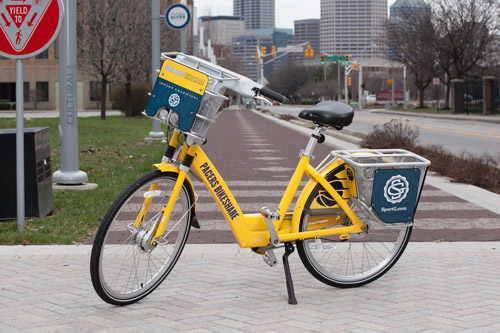With Divvy slated to expand by 175 stations this year, there’s an unprecedented opportunity to increase bike ridership in Chicago. There’s also an opportunity to rethink the Divvy bike design.
A shortcoming I’ve noticed about Divvy, and other systems that use bicycles supplied by Bixi, is the lack of carrying capacity. The bikes feature a narrow front rack, useful for carrying a purse, briefcase, or messenger bag. However, transporting anything larger is inconvenient at best, and a dangerous balancing act at worst. I know how perilous a Divvy journey can be when you’re trying to carry large items or multiple parcels, based on my experiences hauling luggage and grocery bags.
Chicago can do better. Indianapolis’s new Indiana Pacers Bikeshare, for instance, is much more convenient for transporting cargo. The system, run by B-Cycle, which operates bike-share in a number of smaller U.S. cities, features bikes with a large, enclosed front basket, as well as a rear rack and basket. Kevin Kastner, who runs the blog UrbanIndy, has seen people use the baskets to carry groceries, jackets, water bottles, and more.
The current Divvy rack design was chosen to discourage people from using the baskets as trash receptacles. Rear racks may also be seen as a liability, because users might try to use them to carry passengers.
Kastner speculates that since stations are relatively close in Indianapolis, and there are only 250 bikes, compared to Chicago’s 3,000, keeping the bikes garbage-free may be “an easier issue to solve than in other places.” However, the design of the Indianapolis front baskets, which lack sidewalls, helps prevent the bikes-as-trash-cans problem.
The Indianapolis rear racks do feature mesh sidewalls, but using a similar design as the front baskets, or simply having a rack in back, which would allow members to bring their own panniers, would prevent garbage build-up. As for concerns about the rear rack being used to transport human cargo, I am sure a design solution can be devised which would discourage this behavior.
Madison, Wisconsin, is another city with a system run by B-Cycle. Although the standard Madison bikes lack rear racks, they do feature a spacious, enclosed front basket. “It's pretty nice compared to other models I've seen,” says University of Wisconsin med student Matthew Kutz. “I have no problem fitting everything I would carry on my back into the rack.” He has also used Divvy, but found the front rack to be less useful. “You can't go grocery shopping with an open rack.” The Madison system also includes adult tricycles with large rear baskets, which can handle serious cargo hauling and are also useful to folks with mobility issues.
Providing more cargo capacity might help address Divvy’s gender disparity -- 79 percent of member trips are made by men. “One of the comments I’ve heard a number of times, more from women than men, is that they wish Divvy had a somewhat larger rack or basket up front for shopping trips,” said bike advocate and Streetsblog Chicago contributor Anne Alt.
Asked about the possibility of altering the Divvy design, Chicago Department of Transportation assistant commissioner Sean Wiedel said he “does not see that happening” any time in the near future. However, the coming expansion is a golden opportunity to improve the bikes. Providing bike-share vehicles that are useful for more types of trips could be an important step toward making cycling an attractive replacement for driving and achieving the city's mode-share targets.






